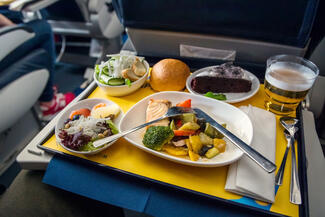Unraveling the Science Behind Our Taste Buds at 30,000 Feet
Have you ever wondered why the tomato juice you reluctantly ordered on your flight suddenly tasted like the nectar of the gods? Or why did the in-flight meal seem oddly satisfying while not Michelin-star quality? Well, fasten your seatbelts, foodies, and jetsetters, because we're about to embark on a high-flying taste adventure!
The Science of Taste at High Altitudes
According to a research paper Airplane noise and the taste of umami, by Charles Spence, Charles Michel, and Barry Smith, It turns out, the environment inside an airplane - the dry air, the pressure, and even the noise - can significantly alter our sense of taste. According to a study by the Fraunhofer Institute, ingredients can taste different under pressurized conditions compared to sea level. The cabin air is 15% drier than the air on the ground, and the pressure inside the cabin is lower. These factors can make it harder to detect odorants, which are crucial for our perception of taste.
The Symphony of Noise and Taste
But it's not just about the air and pressure. The noise levels during air travel can also affect our culinary experience. Research has shown that loud background noise can inhibit our ability to appreciate sweet flavors while enhancing our perception of umami, a savory taste found in foods like tomatoes. This could explain why that can of tomato juice tasted so divine!
Airline Food: A Unique Culinary Challenge
The method of food production for airline meals also contributes to their unique taste. These meals are cooked, chilled, and then reheated hours later, often leading to overcooked and dry dishes. However, airlines are continuously working on improving the quality of in-flight meals, with some even hiring top chefs to create menus that can withstand the challenges of high-altitude dining.
Tips for the Savvy High-Flying Foodie
So, what can you do to enhance your in-flight dining experience? Here are a few tips:
- Stay Hydrated: The dry cabin air can dehydrate your body and your taste buds. Drink plenty of water before and during your flight to keep your taste buds in top shape.
- Go for Umami: Foods rich in umami, like tomatoes and mushrooms, may taste better in flight due to the enhanced perception of this flavor at high altitudes.
- Mind Your Nose: Since our sense of smell contributes significantly to our taste perception, try unblocking your nose before eating your meal. A hot drink might do the trick!
- Embrace the Experience: Remember, part of the fun of traveling is trying new things. So, why not apply the same principle to your in-flight meal? You might be pleasantly surprised!


